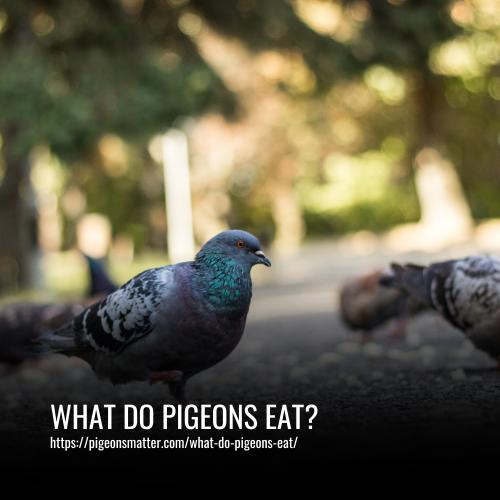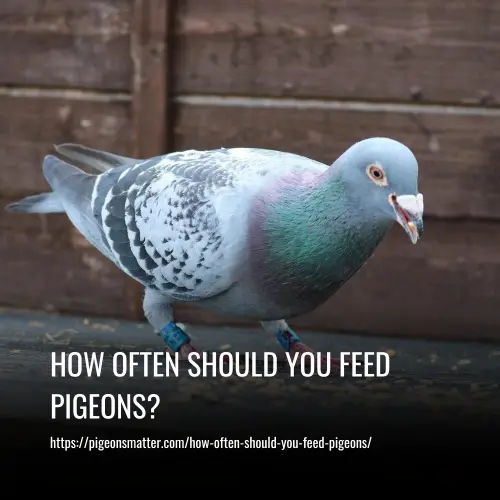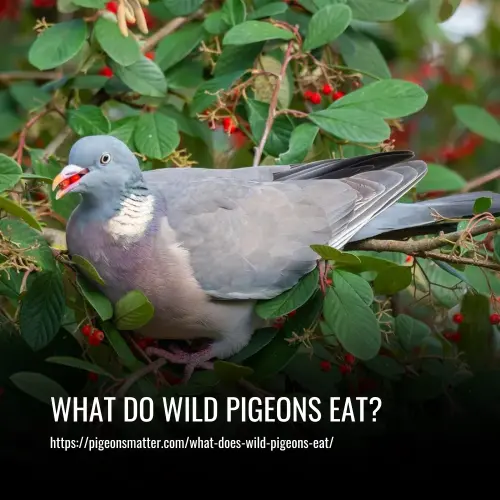Pigeons are omnivores, meaning they eat both plants and animals. They typically consume plant-based foods such as grains, greens, fruit, and berries. Occasionally, they’ll feed on insects, snails, and worms. Their diet is determined by their location.
Pigeons in tropical regions tend to eat more fruits, while those in temperate regions rely more on seeds. The common mourning dove, for example, primarily eats seeds, consuming around 99% of them. On average, pigeons eat 12% to 20% of their body weight each day, which is equivalent to about 71 calories.
Their anatomy is well-suited to their diet, with heavy seed and grain eaters relying on their gizzards to grind up tough food and longer intestines to absorb complex carbohydrates. Conversely, fruit eaters have shorter intestines and thinner gizzards, and are better able to cling to branches and obtain fruits from trees.

A Closer Look At What Wild Pigeons Eat
Wild pigeons have a varied and healthy diet that is dependent on their natural environment. They typically live in forests and coastal areas where they have access to a wide range of foods, including berries, seeds, grains, nuts, vegetables, grit, plants, and freshwater.
As herbivores, their diet consists mainly of these natural foods, but they will eat insects, spiders, and lizards if their hunger demands it. Pigeons require protein and fat to remain healthy, which they can obtain from nuts, fruits, and other animals.
Although they don’t have a specific favorite food, they particularly enjoy seeds, nuts, and vegetables.
What Do Pigeons Eat In Urban Areas?
Pigeons have become experts at thriving in urban environments, despite the challenges they face. However, their diet and living conditions in cities are not as favorable as those of their wild counterparts. Urban pigeons have to scavenge for their food and will eat almost anything they can find, including the leftovers we discard, such as bread, pasta, meat, fish, and confectionary items like chocolates and sweets.
This adaptability is the result of decades of evolution. Unfortunately, scavenging from rubbish bins when they’re desperate for food can be very harmful to pigeons, as the food they consume is often contaminated and can even be fatal. Regardless of their location, pigeons tend to have similar diets.
What is Pigeons’ favorite food?
Pigeons are not picky eaters and will consume a variety of foods. Wild pigeons will eat fruits, vegetables, seeds, and grains. Woodpigeons have a particular liking for leafy greens like lettuce and cabbage, much to the dismay of farmers and gardeners.
Domestic pigeons have a limited food selection compared to their wild counterparts, mainly consuming grains and vegetables like corn, peas, wheat, and sorghum found in commercial pigeon seed mixes. Pigeons do not have a universal preference for food and will adapt to whatever is available to them.
A Complete List of the Top 10 Foods the Pigeon Eats
Pigeons are known for having a diverse diet, which includes a variety of foods. While this list is not exhaustive, it provides insight into the top 10 foods that most pigeons consume. These include seeds and grains, grasses, weeds, green vegetables, herbs, fruits, berries, insects, snails, and earthworms. Whether you’re a bird enthusiast or simply curious about a pigeon’s eating habits, this list is a great starting point to understand what these birds typically eat.
What Do Baby Pigeons Eat?
The diet of baby and newborn pigeons is critical for their early development. They need a high volume of protein to support their muscle, tissue, and physical growth. Without these nutrients, they can suffer from a protein deficiency that can have serious consequences.
During the first week of their lives, baby pigeons rely solely on a special milk produced by their parents called crop milk. Both male and female pigeons secrete this milk, which provides all the essential nutrients they need to survive. If they do not receive this milk, their digestive systems will not develop enough to allow them to eat what adult pigeons eat, making it unlikely that they will survive.
Baby Pigeon Diet – After One Week
As baby pigeons grow, their diet needs to change accordingly. After about a week or so, they will be ready to start eating other foods in addition to their staple crop milk. However, it’s important to note that their digestive systems are still developing, and they will only be able to digest food that has been crushed and softened with the help of their parents’ crop milk.
Baby pigeons achieve full digestive maturity at approximately three weeks old, allowing them to consume adult pigeon food without a dependency on crop milk. Until then, their parents need to continue providing them with the necessary nutrients to aid digestion and support their growth.
Is Bread Bad for Pigeons?
Feeding bread to pigeons is a common practice, but it may not be the best idea. While it may seem like a nice gesture, some experts advise against it because it can lead to several problems.
- Firstly, many types of bread made for humans do not contain all the necessary nutrients for pigeons.
- Secondly, feeding bread can attract other animals and pests which may cause overcrowding and competition among the birds.
- Thirdly, it can make pigeons dependent on humans for food, which can dull their natural foraging abilities.
For those interested in aiding pigeons, it is recommended to establish a small feeding station in your yard, allowing a select few birds to consume meals at their leisure. This will ensure that they receive the proper nutrients and won’t cause overcrowding or dependency on humans.
What Can Pigeons Not Eat?
To keep pigeons healthy, it’s important to know what foods they should avoid. Since pigeons have a complex digestive system, certain foods can be hard for them to digest. Consuming foods that are high in sugar can have negative health effects on pigeons, potentially leading to diabetes and other adverse reactions.
While apples are generally safe for pigeons, apple seeds contain cyanide which can cause gut irritation. Chocolate is another food that should be avoided as it contains theobromine, which can be harmful to pigeons.
Foods high in salt or sodium should also be avoided as pigeons have trouble digesting them, which can lead to health problems. Lastly, persin, a toxic substance present in avocados, should not be fed to pigeons.
Does My Pigeon Or Dove Need Extra Vitamins, Minerals, Or Amino Acids?
If you’re wondering whether your pigeon or dove needs extra vitamins, minerals, or amino acids, it’s best to consult with a veterinarian. They can assess your bird’s diet and determine if any additional supplements are necessary.
Birds that consume a well-rounded diet of pellets typically do not require extra supplements. There are certain times in a bird’s life when specific vitamins or minerals may be necessary, such as during egg laying when calcium supplementation may be required.
If your bird is determined to be deficient in any particular nutrient, supplements are available to help meet its needs.
FAQs
As pigeons and doves age, their digestive systems become more adaptable and can handle most types of food. However, urban pigeons may have access to and consume harmful foods, such as those found in trash bins. It is important for all pigeons and doves, including pet birds, to have a nutritious diet consisting of seeds, fruits, nuts, and vegetables for optimal health.
Feeding rice to pigeons is a commonly believed myth. Although rice lacks nutritional value for pigeons, it does not cause harm if consumed. Cooked or uncooked, rice is considered safe for pigeons to eat.
Pigeons and doves have similar diets and require appropriate nutrients during their adolescent years for proper development. If you have any concerns related to these birds, please consult with our pest control experts for further assistance.
A seed mix containing millet, wheat, corn, and sorghum can be a suitable option for those who want to provide food for or care for pigeons in their backyard. Additionally, offering fresh leafy vegetables, peas, berries, and nuts will promote the health and happiness of the birds.
It’s important to avoid feeding wild birds foods like avocado, apple seeds, high salt content, oil, caffeine, and chocolate as they can be toxic.
Pigeons and doves can stay hydrated by drinking water through a unique straw-like mechanism in their bills which allows them to swallow continuously without tilting their heads back.
Commercial seed mixes, consisting of various grains and seeds like cracked corn, millet, wheat, and sorghum, in addition to vitamins and brewer’s yeast, are commonly used to feed domestic pigeons.
It is recommended to supplement their diet with fresh fruits and vegetables, particularly leafy greens like cabbage.
Conclusion:
Pigeons are adaptable birds that can thrive in a variety of environments. Their diet is diverse, and they can eat a range of foods, including seeds, grains, fruits, and vegetables. While they are often considered pests in urban areas, pigeons play an important role in the ecosystem and can be enjoyed by bird enthusiasts and pet owners alike.
Whether you’re feeding pigeons in the park or caring for pet pigeons at home, it’s important to provide a balanced and nutritious diet to keep these birds healthy and happy.


